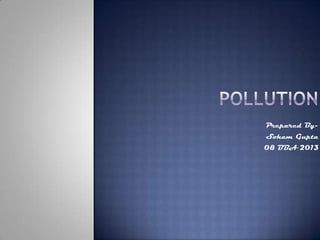Pollution Made by Soham Gupta
- 1. Prepared By- Soham Gupta 08 BBA 2013
- 2. ’é× ’é× ’é× ’é× ’é× ’é× Definition of pollution Types of pollution Air pollution a) Introduction b) Sources c) Effects d) Prevention Water pollution a) Introduction b) Sources c) Effects d) Prevention Land pollution a) Introduction b) Sources c) Effects d) Prevention Noise pollution a) Introduction b) Sources c) Effects d) Prevention
- 3. ’é× Pollution is the introduction of contaminants into a natural environment that cause adverse change. ’é× Pollution can take the form of chemical substances or energy such as noise, heat or light.
- 4. There are four types of pollution ’é× Air Pollution ’é× Water ’é× Land ’é× Noise Pollution Pollution Pollution
- 6. Air pollution is the introduction into the atmosphere of chemicals, particu lates, or biological materials that cause discomfort, disease, or death to humans, damage other living organisms such as food crops, or damage the natural environment or built environment.
- 7. The pollution of air can be caused by natural processes or by human activities. The sources of air pollution are classified into two groups: ’é× Natural Sources ’é× Man made sources Natural Sources of Air Pollution: They are dust storms, forest fires, ash from smoking volcanoes, decay of organic matters and pollen grains floating in air. Manmade Sources of Air Pollution: They are population explosion,deforestation,urbanisation and industrialisation, whose effects can be explained as follows: ’é× Burning of fuels like wood, cow dung cakes, coal and kerosene in homes pollute the air. ’é× Exhaust gases emitted by motor vehicles which pollute the air are the major source of air pollution in big cities. ’é× Industries pollute air by releasing various types of pollutants such as sulphur dioxide, oxides of carbon,nitrogen oxide,chlorine,asbestos dust and cement dust. ’é× Thermal power plants pollute air by emitting sulphur dioxide and fly-ash. ’é× Nuclear power plants pollute air by releasing radioactive rays.
- 8. Acid rain ’é× Green house effects ’é× Smog Short-term health effects: ’é× Irritation to the eyes, nose and throat. ’é× Upper respiratory infections such as bronchitis and pneumonia. ’é× Asthma Long-term health effects: ’é× Chronic respiratory disease. ’é× Lung cancer ’é× Heart disease ’é× Even damage to the brain, nerves, liver, or kidneys. ’é×
- 9. ’é× Tall chimneys should be installed in factories. ’é× Better designed equipment and smokeless fuels should be used in homes and industries. ’é× Renewable and non- polluting sources of energy like solar energy, wind energy,etc,should be used. Automobiles should be properly maintained and adhere to emission control standards. ’é× ’é× More trees should be planted along roadsides and houses.
- 10. Water pollution
- 11. ’é× Any change or modification in the physical, chemical and biological properties of water that has a detrimental consequence on living things is water pollution.
- 12. ’é× About 40% of deaths worldwide are caused by water pollution ’é× Water pollution is caused by organic and inorganic industrial waste discharged in water. ’é× Sewage and waste water. ’é× Oil leakage from ships.
- 13. ’é× Diseases like Cholera ’é× Aquatic life gets destroyed ’é× Affects food chain ’é× Cause algae ’é× Less pure water to drink
- 14. ’é× Rivers should not be used for washing clothes or bathing animals in. ’é× Dams should be created. ’é× In sacred rivers like Ganga dead bodies shouldnŌĆÖt be thrown.
- 16. ’é× Land pollution is the degradation of the earthŌĆÖs surface and misuse of land resources often caused by human activities.
- 17. ’é× Throwing garbage ’é× Construction ’é× Waste ’é× Industrial waste ’é× Mining
- 18. ’é× Agriculture ’é× Littering ’é× Climate ’é× Biodiversity
- 19. ’é× More and more land should be brought under farming. ’é× Trees should be planted everywhere. ’é× Waste matter should be disposed immediately ’é× Avoid drilling lands for underground water. ’é× Avoid using fertilizer and pesticides for farming.
- 21. ’é× Noise pollution is excessive, displeasing humans or animals or machine created noise environmental that disrupts the activity or balance of humans and animals. ’é× Noise pollution not only results to irritation and anger.
- 22. ’é× Traffic noise ’é× Air craft noise ’é× Noise from construction and civil engineers work. ’é× Noise from industries ’é× Noise from other sources
- 23. ’é× Hearing loss ’é× Sleep disturbances ’é× High blood pressure ’é× Stress
- 24. ’é× The government should ensure the new machines are noise proof. ’é× Airports should be away from residential areas. ’é× ŌĆśNo hornŌĆÖ boards should be put on/near school areas. ’é× We should talk less and work more.
- 25. According to me, many living things in the environments around the world are affected by degradation, including animals. Animals play a very important role in our environment, and with degradation killing many animals, we are running into a problem. From lack of food, many animals die of starvation. Animals lose shelter and food sources because of degradation. Pollution can hurt the animals in the environment, even when we just leave plastic pop holders out on the ground, which animals can choke on. Animals are also affected by many kind of pollution, including air pollution which basically suffocates them to death. Animals' shelters and food sources are destroyed not only by humans, but by natural degradation . during winter, salt is distributed on the roads, but some goes on the sides of the roads, and when animals eat plants that are contaminated with the salt, they may get severely sick, or even die. When there is overpopulation of livestock, that can cause overgrazing, which is a way to cause land degradation .Degradation in areas such as the rainforest cause many animals to not only lose food supply and shelter, but their lives.


























